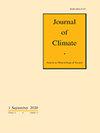Observed global mean state changes modulating the collective influence of the tropical Atlantic and Indian oceans on ENSO
IF 4
2区 地球科学
Q1 METEOROLOGY & ATMOSPHERIC SCIENCES
引用次数: 0
Abstract
Abstract In the last decades, many efforts have been made to understand how different tropical oceanic basins are able to impact El Niño Southern Oscillation (ENSO). However, the collective connectivity among the tropical oceans and their associated influence on ENSO is less understood. Using a complex network methodology, the degree of collective connectivity among the tropical oceans is analyzed focusing on the detection of periods when the tropical basins collectively interact and Atlantic and Indian basins influence the equatorial Pacific sea surface temperatures (SST). The background state for the periods of strong collective connectivity is also investigated. Our results show a marked multidecadal variability in the tropical interbasin connection, with periods of stronger and weaker collective connectivity. These changes seem to be modulated by changes in the North Atlantic ocean mean state a decade in advance. In particular, strong connectivity occurs in periods with colder than average tropical north Atlantic surface ocean. Associated with this cooling an anomalous convergence of the vertical integral of total energy flux (VIEF) takes place over the tropical north-west Atlantic, associated with anomalous divergence of VIEF over the equatorial eastern Pacific. In turn, an anomalous zonal surface pressure gradient over the tropical Pacific weakens the trades over the western equatorial Pacific. Consequently, a shallower thermocline emerges over the western equatorial Pacific, which can enhance thermocline feedbacks, the triggering of ENSO events, and therefore, ENSO variability. By construction, our results put forward opposite conditions for periods of weak tropical basins connectivity. These results have important implications for seasonal to decadal predictions.观测到的全球平均状态变化调节热带大西洋和印度洋对厄尔尼诺/南方涛动的集体影响
摘要 过去几十年来,人们一直在努力了解不同的热带海洋盆地如何影响厄尔尼诺南方涛动(ENSO)。然而,人们对热带海洋之间的集体联系及其对厄尔尼诺/南方涛动的相关影响了解较少。利用复杂网络方法,分析了热带海洋之间的集体联系程度,重点是探测热带盆地集体相互作用以及大西洋和印度洋盆地影响赤道太平洋海面温度(SST)的时期。此外,还研究了强集体连接时期的背景状态。我们的研究结果表明,热带盆地间的联系具有明显的多年代变异性,集体联系时强时弱。这些变化似乎受到北大西洋海洋平均状态十年前变化的调节。特别是在热带北大西洋表层海洋比平均温度更冷的时期,连通性更强。与这种变冷相关的是,西北大西洋热带海面上出现了总能量通量垂直积分(VIEF)的异常收敛,与此同时,东太平洋赤道海面上出现了总能量通量垂直积分的异常发散。反过来,热带太平洋上空异常的地带性表面气压梯度削弱了赤道西太平洋上空的贸易。因此,赤道西太平洋上空出现了较浅的热层,这可能会增强热层反馈,触发厄尔尼诺/南方涛动事件,从而增强厄尔尼诺/南方涛动的变率。从结构上看,我们的结果为热带盆地弱连接时期提出了相反的条件。这些结果对季节性到十年期的预测具有重要意义。
本文章由计算机程序翻译,如有差异,请以英文原文为准。
求助全文
约1分钟内获得全文
求助全文
来源期刊

Journal of Climate
地学-气象与大气科学
CiteScore
9.30
自引率
14.30%
发文量
490
审稿时长
7.5 months
期刊介绍:
The Journal of Climate (JCLI) (ISSN: 0894-8755; eISSN: 1520-0442) publishes research that advances basic understanding of the dynamics and physics of the climate system on large spatial scales, including variability of the atmosphere, oceans, land surface, and cryosphere; past, present, and projected future changes in the climate system; and climate simulation and prediction.
 求助内容:
求助内容: 应助结果提醒方式:
应助结果提醒方式:


